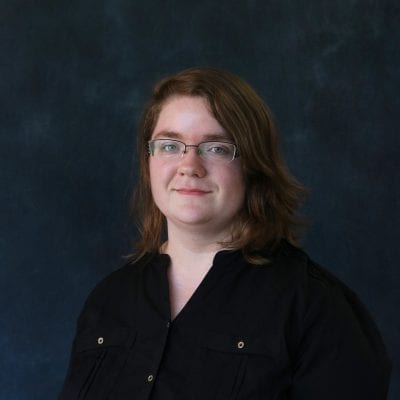MSIS Student Brianna Blackwell Participates in Summer Research Fellowship
 Brianna Blackwell already had an undergraduate and graduate degree in English when she decided to earn her MSIS degree at the University of Tennessee starting in the fall of 2019. Her desire to further pursue research that can be applied in real-world scenarios is part of what piqued her interest in the field of information sciences.
Brianna Blackwell already had an undergraduate and graduate degree in English when she decided to earn her MSIS degree at the University of Tennessee starting in the fall of 2019. Her desire to further pursue research that can be applied in real-world scenarios is part of what piqued her interest in the field of information sciences.
“I wanted to learn about these more directly applicable skills like statistics and programming and qualitative and quantitative research that I could use in digital humanities,” she said.
Blackwell said that some of her most satisfying work while studying English was when she took abstract concepts and grounded them through digital humanities; for example, writing a computer program that produces “concrete, specific, and measurable results” about a research topic. She knew that learning more about information sciences would provide her with more opportunities for such applications, and give her a broader research skillset.
It was in this vein that Blackwell applied, and was accepted to, the Research Experience for Master’s Students at the University of Michigan just after she completed her first two semesters at SIS. Blackwell started the program at the end of May, and will continue working on projects with faculty until mid-August.
“This fellowship is going to be particularly valuable for learning about qualitative research. The project involves grounded theory; coding interviews using qualitative analysis software; and analyzing student, teacher, and archivist experiences in archival education,” she said. “I thought that having experience in information sciences research would help me figure out if that’s the sort of research I want to do in a PhD program, and possibly as a career. Plus, I’m generally interested in archives, which is the main focus for the specific project I applied to.”
The program also offers ongoing professional and research development workshops and assistance, with things like writing doctoral statements for applications. While it was initially an on-site program at the Ann Arbor-based university, it was moved online due to the COVID-19 pandemic. The program is using a lot of cloud-based programs to communicate with the students and give them data needed to conduct their research.
Blackwell said there are two potential projects that she can work on: one is called Engaging the Archives, and it’s focused on encouraging undergraduates to use the archives, and the other is studying culturally responsive STEM teaching in rural libraries for girls of color.
Right now she’s conducting background reading for the archives project, which is an on-going project based on a collaboration between University of Michigan faculty and the Bentley Archives. Faculty created classes with different evaluative measures built into it to see how the undergraduate students used archives, and if doing so resulted in transferable skills. She will be coding and analyzing interviews, as well as collaborating with other fellows and advisors by providing feedback.
Both of these projects are right up Blackwell’s alley, as she said, “I like applying the abstract to specific real world experiences.”